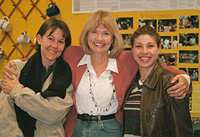![[Currents header graphic]](/homeart/currents_header.gif)
![[Currents header graphic]](/homeart/currents_header.gif)
February 22, 1999
Corinne Miller's job description doesn't say anything about offering a shoulder to cry on, but it should.

|
|
Students Meredith Gafill (left) and Meria Rivera (right) are big fans of Corinne Miller, director of Services for Transfer and Re-Entry Students (STARS). They're pictured in the STARS student lounge in Classroom Unit 1. (more photos)
|
For more than 20 years, Miller has fostered the success of re-entry students at UCSC by providing academic and personal support services. More than once, a student has come into her office in tears and on the verge of dropping out. And more than once, Miller has provided the comfort, information, and encouragement that student needed to go on and succeed.
"It's very rewarding work," said Miller, the director of UCSC's Services for Transfer and Re-Entry Students (STARS) who recently hosted the first systemwide meeting of staff providing support services to re-entry and transfer students.
Only UCSC and UC Berkeley have well-established programs, but several campuses are on the verge of establishing programs, which prompted the meeting, said Miller. The group is meeting again next week at UC San Diego to discuss a systemwide approach to helping students.
"Transfer and re-entry students are a diverse group with special needs," noted Miller. "We serve veterans, single parents, graduate students, married students, and underrepresented minorities, and we want to take a systemwide approach to solving some of the problems we encounter."
Working at a computer in the STARS student lounge in Classroom Unit 1, junior Meria Rivera echoed the comments of many students when she gushed about the support she has received. "We love this place," said Rivera, a junior transfer and re-entry student who is majoring in earth sciences. "This is like home."
At UCSC, programs serving transfer and re-entry students were combined into STARS two years ago. Miller works with Sally Lester, who coordinates Re-Entry Services, and Claudia Parrish, who runs the Transfer Student Resource Center.
With more than 2,700 transfer students on campus, transfers constitute 25 percent of the student population. And the number is going up each year as UCSC participates in a systemwide effort to attract students from the state's community colleges, although students transferring from any college are eligible for services. Re-entry students, who number nearly 1,400 this year, have been out of school for four years and are more than 25 years old, said Miller, noting that the ratio of women to men served on campus is about five to four.
Because many older students have children, STARS offers parent support services, and some events are put on specifically for students over the age of 40.
Transferring to a UC campus can be a real shock for many students, said Miller, describing logistical changes like the switch from the semester to the quarter system but also cultural differences that can be challenging.
"The university is a different culture, and students have less time to get to know their professors under the quarter system," she said. "Classes are often bigger, they have to do more writing, and they're expected to think and write creatively about what they read. Plus, they often have less access to professors than they're used to at community colleges."
Re-entry students face all of those problems and more, particularly those who have families.
"Many are taking a big risk to go back to school," said Miller. "Some have left a well-paying job, so the whole family is making a big sacrifice, and suddenly the parent is spending hours studying. Lots of students have to overcome feelings that they don't have what it takes intellectually, so they have to prove themselves on that front, too."
To address these needs, STARS offers a range of workshops and social events, including "Stardates," which are lunchtime talks on subjects like organizing your life and internship opportunities. A much-loved resource is the "unofficial and uncensored course evaluation book," in which students share their opinion of classes and faculty with future students.
Among the most popular events are faculty dinners that give undergraduates a chance to interact with professors in their field, said Miller.
"Students can be really intimidated by the brilliance of our faculty," she said. "For junior transfers, it's especially important to connect with faculty right away because they're only a year away from applying to graduate schools."
In collaboration with the Coalition for Student Academic Success, STARS also offers a host of academic support workshops, including sessions on study skills, note-taking skills, time management, and test anxiety.
Miller would like to see such academic support services institutionalized at UCSC in a campuswide Learning Center. "Students desperately need it," she said. "Some come here underprepared, especially in math, science, and writing, and they need academic support to get up to the level of rigor here."
For all the challenges they face, re-entry students are very successful at UCSC, said Miller. A greater proportion of re-entry students are elected to Phi Beta Kappa than from the general student population, and many faculty rave about the pleasures of working with re-entry students.
Zack Schlesinger, a professor of physics, finds that re-entry students add to the mix of backgrounds, helping to create a lively atmosphere for learning. "It's valuable in the classroom to have a range of people with different life experiences and attitudes," he said, adding that re-entry students are sometimes more focused about their work, reflecting the fact that most have made "an active choice to be here, rather than just following a path that someone else chose for them."
To make that path as accessible as possible, Miller offers a pep talk during orientation each fall. "I welcome them and remind them that this is their institution. They've worked hard to get here. They and their families have paid taxes to support it," she said. "They are entitled to be here."